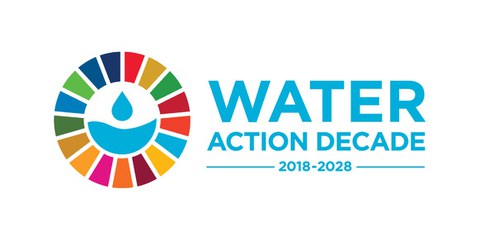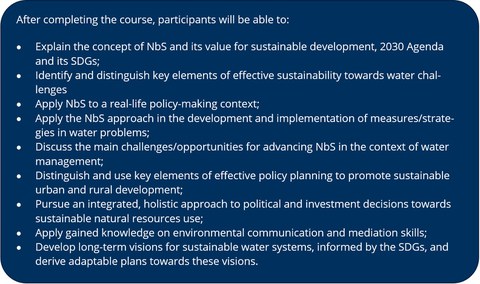88th UNEP/UNESCO/BMUV International Short Course - Nature-based Solutions to emerging water challenges (SC88)
Duration: October 18, 2023 - November 10, 2023 (on-site in Dresden)
Motivation
Many countries are increasingly vulnerable to climate change, which affects both water quantity and quality and is exacerbated by population growth, urbanization, and increasing water demand. This is compounded by the worrying degradation of critical natural resources such as wetlands, forests, rivers, and lakes on which so many depend. This short course aims to demonstrate the potential of nature-based solutions (NbS) to respond to the emerging climate-related challenges in water management by providing a science-based state-of-the-art, presenting a collection of case studies, and discussing lessons learned to date.
The inherent diversity and flexibility of NbS and their broad contribution to sustainable development goals make them a critical mechanism for building resilience to climate change in the water resources sector while also creating an essential contribution to achieving multiple SDGs. Furthermore, in the context of economic recovery from the COVID pandemic, there is a need and an opportunity to invest in solutions that can benefit across sectors. NbS provide such an opportunity through infrastructure solutions that address vital water management and climate change challenges while providing a wide range of environmental and socio-economic benefits.
Course concept
This course offers a unique opportunity to discuss how nature-based solutions can help tackle many different environmental risks in urban and rural territories especially related to water challenges, while offering additional benefits for health, well-being and economies. The short course will explore critical topics such as:
- The path towards resilient and sustainable ecosystems
- Planetary Boundaries and Doughnut Economy
- Sendai Framework for Disaster Risk Reduction and the synergies with climate action
- The concept of NbS
- Theory of change and systemic change
- Nature-based Solutions in water management
- Policies Frameworks for implementing NbS in urban and rural territories
- Ecosystem-based adaptation and climate justice
Moreover, case studies presented during field trips and seminars range from urban greening projects and coastal protection initiatives to local wastewater treatment and municipal eco-engineering projects, demonstrating the versatility of NbS options for different conditions. The short course also looks at the international, national, and local mechanisms for implementing and financing NbS.
Objectives
With the course-accompanying creation of Post-Training Action Plans (PTAPs), participants prepare themselves to transfer knowledge acquired in the training into their professional action spaces.
Target groups
This course is aimed at experts who prepare and implement political decisions and practical measures towards the goals of ecosystem restoration and sustainable development in ministries, authorities, local government and non-governmental institutions of developing countries (including emerging economies).
We expect a high motivation to explore concepts for ecosystem sustainability and to work towards implementing them. A first university degree (e.g., BA, BSc) in a related field is essential. Adequate communication skills in the English language and the nomination by the delegating institution for this full-time course are mandatory.
What makes participating in this course transformative?
- Experience of the CIPSEM team in conducting engaging, meaningful trainings considering the challenges in developing countries and emerging economies
- A full-time, 3,5-weeks learning experience combining sessions and group work with guided self-study units and exchange on our network
-
Renowned international and German facilitators
- Participants become part of a large international network of environmental experts and leaders (more than 2 500 alumni from 145 countries)
- Transfer of the gained knowledge and skills though mentored development of post-training action plans
- Participants stay in our comfortable single studio apartments and receive a stipend to cover basic living expenses (550 €). In addition, flights, health insurance, public transport tickets will be covered. The course office will provide additional manifold assistance.
-
Alumni of this course can apply for one of several Transfer-to-Action-Fellowships supporting the implementation of the post-training action plan with 2000 €
Application and participation
Qualified professionals are welcome to apply for this training from 15 February until 29 March 2023 on CIPSEM’s online application portal. The Steering Committee selects 21 participants of this course by early June 2023. Only selected participants will be informed via email. Successful participants are awarded a Certificate of Proficiency in Nature-based Solutions to emerging water challenges.



